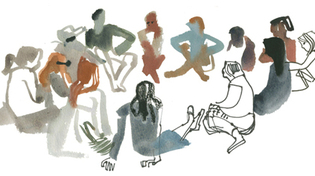 loading
loading
A rebel comes home Annabel WrightView full imageIt was in struggling New York State farm country where something unforeseen happened. Malcolm Gladwell would call it a tipping point. The smart, hard-working, delightful daughter of a neighbor up the road—he had a cattle farm—had been accepted by Yale, Harvard, and Dartmouth. One day she dropped by the kitchen to ask me about my alma mater. She had mud on her boots. I told her to sit at the kitchen table. Then I said, “You’re not getting back out of that door until I’ve convinced you to go to Yale.” An hour later, I let her leave. She chose Yale. My time of giving back had begun. In modest fashion, yes. But for real. I just didn’t know it. It took me another 15 years to find a better way to give back. By then, we’d moved closer to the city, to a little village on the New York–Connecticut border. After enjoying a year-long fellowship at Harvard (where I felt as if I were part of a brand more than a bastion), and then more than a decade on the staff of that glossy Condé Nast monthly, an editorial turnover at my magazine—coupled with my absurd salary, and the fact that I’d come to believe others’ glowing praise of my increasingly mail-it-in prose—cut me loose. I was unmoored and jobless. So I took a staff position on the faculty of a prestigious private intermediate school in northwestern Connecticut, where I taught ninth-graders Ancient Civilization and English and headed the drama department. The Indian Mountain School is a school of privilege, of tradition, founded on the worship of wealth as well as wisdom. Its top students were privileged to be accepted a half-mile up the hill to Hotchkiss. The least gifted went to lesser New England prep schools. That was the time when I became a Yalie. In my own fashion. But a Yalie nonetheless. A few years earlier, I’d written a magazine piece on how to age gracefully. The research for the piece had involved not only many happy drinks with the likes of Walter Cronkite and Mikhail Baryshnikov, but also reading a book called Aging Well, by Harvard doctor George Vaillant. It is a remarkable study of the keys to growing old gracefully. My takeaway from writing that story wasn’t, as it would have been in previous years, that I’d shared bourbons and vodkas with a couple of my idols. What stayed with me now was something Vaillant said: that aging gracefully requires knowing when to put the ego aside and start passing on what you’ve learned. In my new role, as a teacher of 15- and 16-year-olds, it turned out I knew a little bit about a thousand different things—so much so that, with acting chops I’d developed in New Haven, I became someone useful to my students: the out-of-the-box teacher/mentor who could lecture about bonobos, Babylon, fellow hitchhikers on-ramp on Interstate 15 in Barstow, the Beats, Bishop Berkeley, Bill Murray, Braque, and bebop. “Mr. Richmond,” Justin said one day in English, “how do you know all this stuff?” “I don’t know,” I said. But, on reflection, I did know. It was because many years ago I’d spent four years surrounded by brilliant, curious, talented peers and professors, and somehow their knowledge, and their curiosity about everything and anything, had osmosed its way past the crust of my ego and into my brain, and my heart. And now, finding a larger knowledge ingrained as if into my DNA—all of it combined with four decades of interviewing more than a thousand people as a journalist, from the military to the movies to the pitcher’s mound—I had found a fertile field to sow it: 15-year-old minds eager to learn whether there was something other than law school, hedge funds, and skiing vacations in their futures. I did my best to pump up the troubled students (the school put them in my classes, thinking somehow I could buoy them), to energize them and teach them self-esteem. But with every new class, I also stressed the likely unattainable goal: Yale. Steer clear of Harvard. And never even consider that place down in Jersey. The great thing about teaching turned out to be that, through experiencing the students’ own journeys, I myself was learning again. They were taking me back. To teach them well, I had to reacquaint myself with scholarship. I had to comb the shelves of The Strand for unknown texts. Troll the Internet for obscure arguments about the Epic of Gilgamesh. Pluck tomes from the shelves of Hotchkiss’s library. And it was while teaching ninth-grade Ancient Civ, and plowing through some of my own old New Haven tomes to get rid of the cobwebs, that I rediscovered something I’d been taught up in the classics tower 40 years earlier: that for forty thousand years, we have all belonged to one tribe or another. As individuals, we would never survive.
|
|